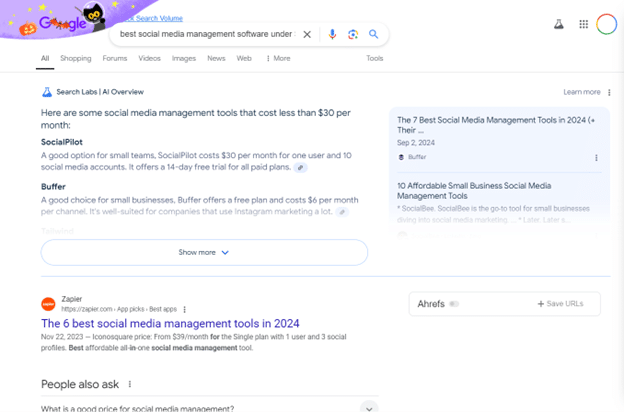Google’s integration of AI into search results marks a significant shift in how information is organized and presented online. AI is transforming search experiences, making them more dynamic and personalized. With AI, Google aims to better understand user intent, offering richer and more relevant information directly within search results.
It’s important for business owners to understand how Google’s AI-powered search works, its impact on user behavior and SEO, and the strategies your business can adopt to stay visible and competitive in this changing environment. Whether you’re curious about the technology behind search or want to optimize your business’s online presence, this guide will help you understand what Google’s AI means for you.
What are AI Search Results?
Google’s AI search results are generated using artificial intelligence to better understand what users are really looking for when they search. AI-powered results go beyond traditional keyword matching; they aim to understand the context of questions or keywords, providing richer and more personalized information.
How Are AI Search Results Generated?
Gemini, Google’s AI model, enhances the search engine’s ability to understand language nuances. It uses advanced techniques like multi-step reasoning and the ability to analyze different types of content simultaneously to provide more complete responses. Additionally, AI looks at user behavior, search patterns, and historical data to offer direct answers, reducing the need for users to click through multiple links.
The Evolution of Google Search Experience
Over the past 25 years, Google has continually evolved its search engine with significant advancements in AI. Notable innovations like Lens for visual search and multisearch (which allows users to search using both images and text) have transformed how people interact with search. The use of generative AI now enables Google to answer more complex, multi-faceted questions and organize information more effectively.
Why Has Google Adopted AI in Search?
Google’s AI integration aims to improve search quality by delivering faster, more accurate answers. It enhances user experience by providing direct and contextually relevant information. AI also makes search more personalized, delivering tailored results based on factors like location, search history, and device type.
Some of the features you’ll see with Google’s new AI-powered search include:
- AI Overviews: AI generates quick summaries of topics, allowing users to get a broad understanding without needing to click multiple links. Users can adjust these overviews for simpler or more detailed explanations.
- AI-Organized Results: AI helps organize search results under unique headings, making it easier to brainstorm or explore ideas.
- Planning Capabilities: Google AI can help with planning activities, like creating a meal or trip plans, with the ability to adjust directly within the search experience.
- Conversational Mode: Google’s new conversational mode allows users to ask follow-up questions, with context carried over from one query to the next. This enables a more interactive and fluid search experience, helping users explore topics in greater depth.
User Behavior Changes
These new advancements in Google’s search capabilities will likely result in a variety of changes in how people conduct online searches and interact with Google’s search engine:
- AI makes it easier for users to get quick answers, influencing how they interact with search results.
- There has been an increase in zero-click searches, where users find answers directly on the search results page.
- AI Overviews have also led to increased engagement with a wider variety of websites, as they provide links for deeper exploration of topics.
- The conversational mode introduced in AI search makes it more interactive, allowing users to refine and follow up on queries without starting over, which impacts how users navigate information.
Impact on Organic SEO

AI-powered search is likely to result in the following changes in ranking factors:
- Stronger emphasis on content relevance and quality over just keyword density
- Content that is structured in a way that is easily summarized by AI is more likely to perform well, making content clarity more important
Challenges posed by AI Search include:
- Increased competition for featured snippets and other rich search elements that appear prominently on the page
- Personalized AI search results can make it challenging to track how users interact with content
- Businesses need to understand how AI features like AI Overviews and video search impact traffic distribution
- Google’s Shopping Graph aggregates detailed product information, so businesses must ensure their listings on e-commerce websites are up-to-date and competitive to gain visibility
Opportunities for Businesses
Google’s AI search also presents several opportunities for businesses to gain a competitive advantage in their industry if they adapt to the changes in search before their competitors.
Moving forward, it will be important to optimize your website for AI Search. This involves:
- Focusing on creating high-quality content that directly answers user questions
- Structuring content to be easily summarized by AI, increasing the chances of appearing in AI Overviews
Leveraging these new search features can also help you improve your ability to rank well:
- Aim to appear in rich snippets, knowledge panels, and AI Overviews for better visibility
- Adapt content to fit AI-organized search results, ensuring it can be featured under relevant headings
- Optimize product listings for AI-powered shopping experiences by including detailed product information, reviews, and competitive pricing to be included in Google’s Shopping Graph
Strategies for Thriving with AI Search
AI search will require a shift in SEO strategies in order to ensure you continue to rank well.
Technical SEO best practices will be critical to ranking well in an era of AI search. Make sure to:
- Improve site speed and optimize for mobile devices to enhance user experience
- Ensure site security (HTTPS) and accessibility to make sure your site is easy to use and trustworthy
- Create well-structured URL paths that are easy for AI agents and web scrapers to navigate, improving content indexing and accessibility
Link building will also become an increasingly important part of your SEO strategy. This involves:
- Building high-quality backlinks from authoritative websites to improve domain authority and search visibility
- Developing relationships with industry influencers and publishers to acquire links that enhance credibility and relevance
Structured URL paths for AI agents and web scrapers will also be important:
- Ensure URLs are descriptive, logical, and hierarchical, making it easier for AI agents and web scrapers to understand the structure of your website
- Use consistent naming conventions to enhance the clarity of your URL paths, improving the discoverability of your content
Natural language will also be critical to ensure your content is easily processed by Google’s AI-powered search function:
- Incorporate natural language phrases and conversational keywords throughout your content to align with AI’s understanding of user intent
- Optimize content for complex, natural language queries that users might use with AI-enhanced search capabilities
- Include conversational keywords that users may use when engaging in conversational mode, enhancing the chances of being included in follow-up searches
Future Trends and Predictions
AI search is here to stay, and it will likely play an increasingly prominent role in the way users acquire the information they need:
- AI capabilities are expected to grow, affecting how users search and interact with content
- Features like video search, planning tools, and conversational interactions will likely expand in scope
- As Google expands its use of generative AI, expect more capabilities that offer deeper contextual understanding and more interactive experiences
It’s also important to understand that AI search is still in its infancy. It’s likely to evolve as these capabilities become more robust and complex, so marketers will need to prepare for continuous change:
- Agility in digital marketing strategies will be crucial to keep up with these ongoing changes in AI search
- Businesses must prioritize ongoing education and adaptation to stay ahead of evolving search technologies
- Preparing for AI’s increasing role in organizing and categorizing search results is important for maintaining visibility
- Sign up for Search Labs to gain early access to new features like SGE (Search Generative Experience) and understand upcoming changes before they are rolled out widely
Webolutions Can Help Your Business Leverage AI Search to Thrive
As AI reshapes the future of search, adapting to Google’s AI-driven results is essential for digital marketers and businesses looking to stay competitive. At Webolutions, we’re excited about the new possibilities this technology brings to enhance SEO strategies, connect with audiences, and drive impactful results.
By embracing AI-powered search advancements, marketing teams can refine their approach, stay agile, and unlock greater efficiencies. Our team is constantly monitoring this emerging technology in order to stay on the forefront of AI search, and we can help your business leverage this new functionality to gain a competitive advantage in your market.
If you’re ready to see how these changes can impact your business, contact us for a free consultation. Webolutions provides comprehensive digital marketing services for businesses throughout the country.




